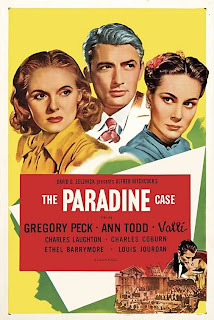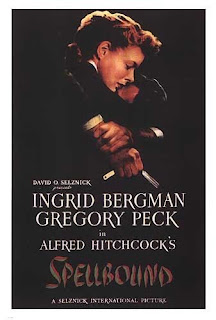
Title: The Paradine Case
Year: 1947
Studio: A Selznick International Picture
Screenplay: David O Selznick & Alma Reville
Source Material: From the novel by Robert Hichens
Running Time: 109 minutes
A black & white picture
Saturday 22nd January, 11:45am
This will be my last entry for a few weeks as I am going to be on holiday for the month of February and I simply will not have time to watch and blog I'm afraid. Still, I feel I am becoming a little stale in my write-ups and a break may do me the world of good and perhaps inject a certain energy back into my writing. Heaven knows I need it. Even today, as I watched the movie, I felt a certain lethargy and apathy towards the project, but I continue on.
It was a little stressful trying to get this one done as I have so much to do prior to my vacation and there is such little time left. However, I squeezed it in - please forgive me if this entry is a little shorter than normal too. I don't seem to have my heart in it this weekend.
Cast
Anthony Keane - Gregory Peck
Gay Keane - Ann Todd
Judge Lord Horfield - Charles Laughton
Sir Simon Flaquer - Charles Coburn
Lady Sophie Horfield - Ethel Barrymore
Andre LaTour - Louis Jordan
Mrs Paradine - Alida Valli (credited merely as 'Valli')
Counsel for the Prosecution - Leo G Carroll
Judy Flaquer - Joan Tetzel
Innkeeper - Isobel Elsom
Synopsis
London. The time: the recent Present
Maddalena Paradine is at home playing the piano. Her butler announces the arrival of the police who politely inform her that they are there to arrest her for the willful murder of her husband, Colonel Richard Patrick Irving Paradine on 6th May 1946 by poisoning. Mrs Paradine is graceful and calm as she collects her things and goes with them.
Her solicitor, Sir Simon Flaquer, tells her that she will be represented by Anthony Keane, a lawyer with a superb reputation. Keane's wife, Gay, believes Mrs Paradine is innocent just because she seems like a nice sort of person. Tony is the sort of man to apply a little more logic to the situation, but upon meeting Mrs Paradine he is almost bewitched by her beauty and cannot bring himself to believe her guilty of anything.
One evening, at the home of Judge Horfield, there is a dinner hosted by the Horfields and attended by the Keanes, Sir Simon and his daughter Judy. Horfield is a rather lascivious fellow and makes uncomfortable advances on poor Gay Keane but she is strong enough to brush him off as politely as she can manage.
She also begins to become a little jealous as she notices how her husband is becoming more and more infatuated with his client. She even overhears and impassioned speech he makes in her defence. She worries that she may be losing her hold on him.
Anthony decides he wants to visit the Paradine home in Cumberland and takes a trip up to the Lake district. He stays at a local inn and listens to the gossip regarding the case so he can get a better understanding of people's views. The next day he takes a pony and trap up to the Hall and when he gets there he meets the Valet, LaTour but he stands in the shadows and hides from Keane. The housekeeper shows Keane around the home and he assesses the area making mental notes. He is surprised to discover that LaTour's bedroom was alongside the main rooms and not in the servants' quarters.
When he returns to the inn, he is making himself comfortable on a stormy night but he is aroused by a knocking at the window. He draws back the curtains to see Andre LaTour standing there. Andre wanted to come and see Keane on his own terms and explains that Mrs Paradine is evil. Anthony is unimpressed and forces him to leave. The next day, Tony returns to London. When he tells Mrs Paradine about his trip, she is very unimpressed and tells him so. He also admits that he is attracted to her.
During the trial, Keane attempts a couple of lines of defense - he suggests that the colonel committed an act of suicide as he was so unhappy with his life as a blind man. When this fails, he tries to direct blame to LaTour who was named as a beneficiary of the late colonel's will and also was a deft hand with poison having put down a dog not so long before. During the whole drama of the courtroom, LaTour confesses he and Mrs Paradine had an affair.
The court adjourns.
The following day, LaTour is discovered dead having taken his own life. Mrs Paradine is distraught and suddenly apathetic and admits to killing her husband. There was no longer any point to her life now that her husband and lover are now dead.
Keane is shaken and horrified by events and feels like he is a disgrace to the profession. He is comforted later by his loyal wife, Gay who says he should continue on and fight the good fight as this is merely one obstacle.
The End
Great Lines
Gay Keane: "Nice people don't go around murdering other nice people."
Lord Horfield: "I do not like to be interrupted in the middle of an insult."
Judy Flaquer: "I hope- no, I don't hope they hang her. I don't like breaking pretty things."
Andre LaTour: "I would never have served a woman. It's not in my character to do that."
Comments
Firstly I want to mention Louis Jordan who has had a long and varied career. He is a stunningly handsome fellow and in The Paradine Case hols his weight against the equally talented and good-looking Gregory Peck.
It has long been noted that the forums on www.imdb.com are plagued by morons and it is a bit of a joke that under the majority of actors' profiles, there will be one discussion board asking "Is he gay?" or similar. Whilst looking up Louis Jordan's profile, I came across this very question and rolled my eyes. The poster stated "He has gay aspect" (?) but one person made me laugh with their succinct response; "He's French, not gay."
Comedy gold.
Hitchcock handles the different locations brilliantly creating some claustrophobic atmospheres within certain buildings (The prison and the Paradine home.
His homing in on Ann Todd's flesh from the viewpoint of Charles Laughton is eerie and disturbing.
One of my main problems with this film is that I have absolutely no sympathy for Mrs Paradine. There isn't one moment where I feel like she might be an innocent awaiting her deathly fate. She looks guilty from the moment we see her. I know we should feel sorry for her, but she just leaves me cold.
My pick for favourite touches in this film have to be the shadows which disguise LaTour's stunning features the first few times Keane is near him, only for his striking looks to be 'announced' by the vicious winds with his arrival at Keane's room at the inn. Perfectly dramatic and brilliantly effective.
Oh, and it was years and years until I finally watched this film (in fact, I watched it only last year for the very first time) and I was surprised to learn that it was pronounced Paradene not Paradyne as I had been referring to it for all the years previous. The latter still sounds better if you ask me. But then, I always say 'scone' as "scohne" to rhyme with 'cone' not "scon" to rhyme with 'gone'.
It's only 'Scon' when there's none left! (ho ho ho)
My Verdict
The cast is rather splendid and Hitchcock directs as beautifully as ever (the scenes in the Lake District are gorgeously shot), but the film as a whole is a little lacklustre. 5/10




